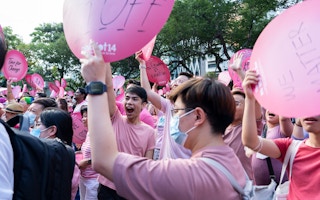Singapore will repeal a colonial-era ban on sex between men, a move long called for by the LGBTQ+ community in the city-state.
To continue reading, subscribe to Eco‑Business.
There's something for everyone. We offer a range of subscription plans.
- Access our stories and receive our Insights Weekly newsletter with the free EB Member plan.
- Unlock unlimited access to our content and archive with EB Circle.
- Publish your content with EB Premium.
Section 377A of the penal code, as the law is called, will be dropped amid what the country’s Prime Minister Lee Hsien Loong describes as an appreciable shift in public attitude on the issue. He added that Section 377A was an “untidy compromise” in past years.
“From the national point of view, private sexual behaviour between consenting adults does not raise any law-and-order issue. There is no justification to prosecute people for it, nor to make it a crime,” he said during Singapore’s National Day Rally, regarded as one of the country’s most important political speeches annually.
Singapore’s government has long maintained that it does not enforce Section 377A, while the country’s top court also said this year that the rule cannot be used to prosecute men having sex.
The court had also warned that there is a chance the rule could be toppled by a court ruling, amid a series of challenges by lawyers and civil society groups.
Public surveys in recent years have found dwindling support for the maintaining of Section 377A, as well as greater acceptance of same-sex relationships in Singapore – though no large majority exists in either camp. An alliance of churches in Singapore spoke up against repealing Section 377A as recently as Friday (19 August).
“We need to find the right way to reconcile and accommodate both the traditional models of our society, and the aspiration of gay Singaporeans to be respected and accepted,” said Lee.
A statement signed by 22 LGBTQ+ organisations in Singapore and broadcasted by advocacy group Pink Dot SG said the groups were “relieved” by the announcement.
But it added that the action had arrived “too late for many”.
“To the past victims of Section 377A and its cascading effects, including those who have faced threats of police entrapment, raids and criminal charges, repeal will never be able to fully right the historic wrongs that you faced,” the statement said.
The United Nations, through an Asia Pacific programme studying LGBTQ+ inclusivity, says promoting the community’s rights contributes to several Sustainable Development Goals, such as good health, decent work and fostering peace.
India, which many regard as a conservative society, repealed its own equivalent of Section 377A back in 2018.
Upholding heterosexual marriage
In doing away with Section 377A, Lee also promised to amend Singapore’s constitution to better safeguard marriage as a union between one man and one woman.
He said the move will help limit changes to what “most Singaporeans will accept”, and prevent the constitution from being used to mount challenges on what legal marriages should recognise.
“By and large, Singapore is a traditional society, with conservative social values. We believe that marriage should be between a man and a woman,” Lee said.
“Children should be born and raised within such families. The traditional family should form the basic building block of our society. All Singaporeans would like to keep our society like this. This is the government’s position too,” he added.
Singapore’s existing definition of marriage is already coded in various national laws. Recognising the definition in the country’s constitution would allow it to form the basis of all national laws where relevant. Changing the constitution also requires a stronger two-third majority from lawmakers.
Some religious groups have called for the move in past weeks, to the opposition of LGBTQ+ groups.
“We urge the government not to heed recent calls from religious conservatives to enshrine the definition of marriage into the Constitution. Such a decision will undermine the secular character of our Constitution, codify further discrimination into supreme law, and tie the hands of future Parliaments,” said Pink Dot SG spokesperson Clement Tan.
The government reiterated this May that it does not support the formation of same-sex families, nor for same-sex couples to adopt children. It has designated 2022 as the “Year of Celebrating Singapore Families”, with activities planned including tree-planting sessions for families with newborns, a carnival, as well as marriage and parenting programmes.
Same-sex couples in Singapore continue to face limitations in Singapore’s public housing system, which provides homes for almost 80 per cent of its residents. They must wait till they are 35 years old to apply for an apartment, and are entirely barred from such apartments in prime estates.
Movies depicting homosexual themes continue to receive mature ratings by its media regulator, while LGBTQ+ representations are heavily restricted on free-to-air television in the city-state.
Asia Pacific has been slow compared to Western nations in recognising LGBTQ+ rights. Out of 31 global jurisdictions that recognise same-sex marriage, only three – Australia, New Zealand and Taiwan – are in the region.
Correction note: the headline has been edited for accuracy.








